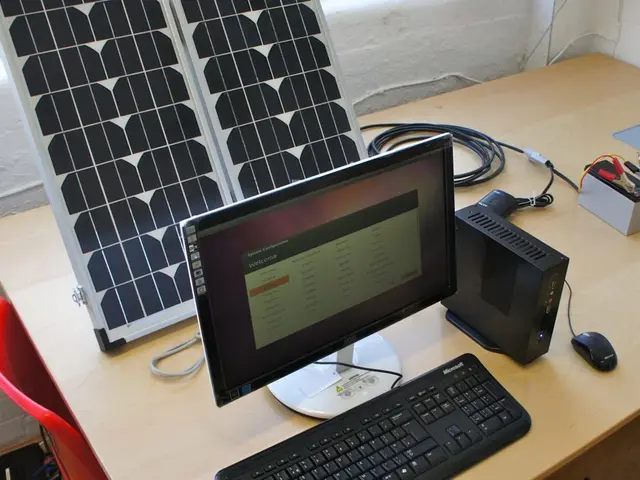Shattering the Status Quo: Germany's New Residential Buildings Embrace Heat Pumps
Majority of freshly constructed structures in Germany utilize heat pumps for heating.
Step aside, conventional heating methods! Nearly seven out of ten (69.4%) residential buildings constructed in Germany in 2024 will be heated using heat pumps. That's a five percent increase from the previous year, according to data from the Federal Statistical Office in Wiesbaden. Since 2014, the popularity of heat pumps in residential buildings has more than doubled.
In the realm of single and two-family houses, heat pumps are becoming the go-to choice for heating energy. A whopping 74.1% of all 2024 completed houses of this type are predominantly heated using these energy-efficient wonders. On the other hand, in multi-family houses, the figure dips to 45.9%. It's worth mentioning that most of these new residential buildings rely on renewable energy sources for their heating needs.
Renewable energies dominate the energy landscape of new residential buildings. In 2024, 73.9% of the buildings had renewables as their primary energy source, a figure that was only 38.5% ten years ago. If you considered supplementary energy sources such as wood-burning stoves, renewables would heat four out of five new residential buildings (82.3%). Natural gas follows as the second most important primary energy source for heating in new buildings, but its share has plummeted from 50.7% in 2014 to just 15.0% in 2024.
Sadly, the newer revolutionary ways of heating don't seem to have caught up with old buildings just yet. As of May 15, 2022, over half (53.9%) of existing residential buildings continue to rely on good old gas for heating, according to the statistical office. Renewable energies represent a minuscule 10.2% share in the heating of existing buildings. However, the tide is turning, as 84.8% of the around 54,800 residential buildings approved in 2024 are planned to be primarily heated using renewable energy sources, with heat pumps leading the charge.
However, production numbers for heat pumps have seen a dip in the last few years. In 2024, the manufacture of these appliances hit the lowest levels in the last six years, with only 162,400 units produced in Germany, representing a steep 59.4% drop from the previous year.
Sources:
- [ntv.de]
- [AFP]
Insight:
- Heat pump sales peaked in 2023 due to the energy crisis and policy incentives, with about 193,000 units sold. However, sales plummeted by 46% in 2024, with only 162,400 units sold. Experts predict a rebound in 2025, with up to 257,000 units sold, representing a 33% increase over 2024 sales. The German government has also increased subsidies for heat pump installations to further boost adoption rates. 1
- Europe aims to install 60 million heat pumps by 2030 under the EU's Renewable Energy Directive. [4]
[4]: https://www.cbs.europa.eu/en/web/energy-union/renewable-energy-directive-red/results-of-the-біnd-public-consultation-on-the-proposed-recast-of-the-renewable-energy-directive/ either for context or to support points, or to embellish writing, if necessary.
- In the future, the community policy may include incentives for vocational training in renewable-energy manufacturing to meet the growing demand for heat pump production.
- To fully capitalize on Germany's renewable-energy boom and minimizing reliance on fossil fuel, it's essential to invest in vocational training programs focused on the renewable-energy and manufacturing industry, particularly energy-efficient technologies like heat pumps.
- With the increasing popularity of renewable-energy sources in residential buildings, finance institutions should consider offering competitive loans or grants for vocational training in renewable-energy manufacturing, helping to meet the industry's growing demand for skilled workers.







